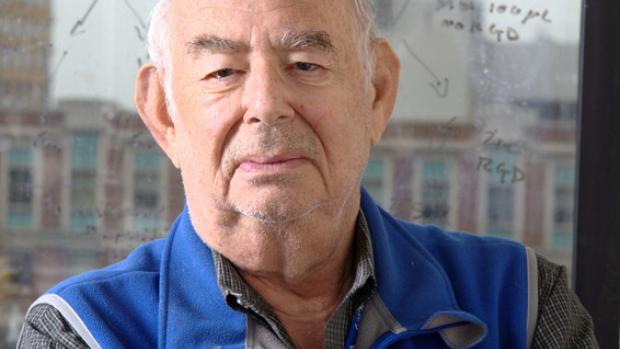American Chemical Society Gives Professor Eli Pearce Rock Star of Chemistry Honor

When the American Chemical Society (ACS) held its national meeting and exposition in Dallas in early 2014, one of the young attendees became very excited to spot Eli Pearce, a research professor at the NYU Polytechnic School of Engineering and a past president of the ACS. It was, he later said, like meeting a rock star. Thus was born the idea for a new ACS initiative: in August, at a national meeting held in San Francisco, the group will host the inaugural “Networking with the Rock Stars of Chemistry” event, aimed at introducing new members to eminent leaders in the field.
We sat down with Professor Pearce, who earned his Ph.D. here in 1958 and joined the faculty in 1974, to get his thoughts about being officially named to the ACS’s first group of Rock Stars, what is was like to study with such luminaries as Herman Mark and Charles Overberger, how the School of Engineering has changed over the years, and more.
Q: We understand that you’re helping the archivist at the Bern Dibner Library organize the Herman Mark collection. What was it like to study with the scientist known as the Father of Polymer Chemistry? And it must have also been fascinating to know Charles Overberger, who pioneered a chemistry-oriented pre-medical program here back in the early 1960s.
A: They were both wonderful men. An interesting thing about Mark was that he was a very elegant dresser. He wore a well-tailored suit and tie at all times. You might have thought from looking at him that he was snobbish or unapproachable, but he was the exact opposite—he was an exceptionally down-to-earth, friendly person. He was also a truly engaging speaker; attending one of his classes was just as good as going to the theater. Incidentally, the Polymer Research Institute that he started here in 1946 was named a National Historic Chemical Landmark by the ACS in 2003. There’s a bronze plaque that everyone should make sure to see.
I got to know Overberger very well because it turned out that I lived not far from him. When I was taking his class, he used to drive me home afterwards. I really appreciated that because it saved me the five-cent trolley fare. Like me, Overberger served as an ACS president at one time. I can’t say that any of my students have been president of that group yet, although one did ascend to the presidency of the Korean Chemical Society.
Q: You’ve experienced the School of Engineering as both a student and a professor, and your history here spans several decades. From that unique vantage point, can you describe how the school has changed?
A: Obviously there have been notable improvements in the physical facilities, and scientific advances have affected the courses and labs offered. One important thing hasn’t changed though.
I was the son of immigrants from Russia, and while they valued education, they had not attended college themselves. People from around the world are still coming to the United States and sending their children to the Polytechnic School of Engineering. Like me, many of these students are the first in their families to gain a higher education. I feel a kinship with them. A hands-on, practical field like engineering provides them with a way to enter the middle class and, eventually, beyond.
My own son and daughter didn’t have to worry about that. They’re now a professor of law and a psychologist. Succeeding generations will be able to become poets.
Q: You have so many professional accomplishments, from directing the Polymer Research Institute that Mark had founded from 1981 to 1996, serving as a dean here from 1982 to 1990, publishing numerous papers, and winning a host of awards and medals. Is there anything you remember with particular pride?
A: When I was president of the ACS, I helped launch a movement to get more women involved in chemistry. It’s hard to fathom, but the numbers are now flipping. More women than men are becoming chemists.
My late wife was a great influence on me. She had quite modern sensibilities. During a period when it was unusual for a woman to have a job outside the home, she became a social worker, and she was very accomplished.
Q: If you had to briefly summarize your philosophy of life, what would you say?
A: It’s up to the individual to turn the negative into the positive. You have to maintain that mindset on a daily basis. Here’s an example from my own career. Before I was hired as a professor, I worked in private industry. At one job I was tasked with making recommendations on how the company was being run. I recommended firing certain executives, and in response, I found myself fired instead.
I had two young children to support, and I could have sulked or panicked. However, I had always been an active networker, particularly within the ACS, and within a few weeks I had an even better job, as director of the Camille Dreyfus Laboratory at the Research Triangle Institute, in North Carolina. Something that could have been a real problem turned into an opportunity. That also brings up the fact that it’s very important to network.
Q: We read that ACS Executive Director Madeleine Jacobs has referred to you as a legend in your field. That must be gratifying. How do you feel about also being named an official Rock Star by the ACS?
A: I’m delighted! And it’s somewhat fitting because I was quite a good dancer when I was younger.




